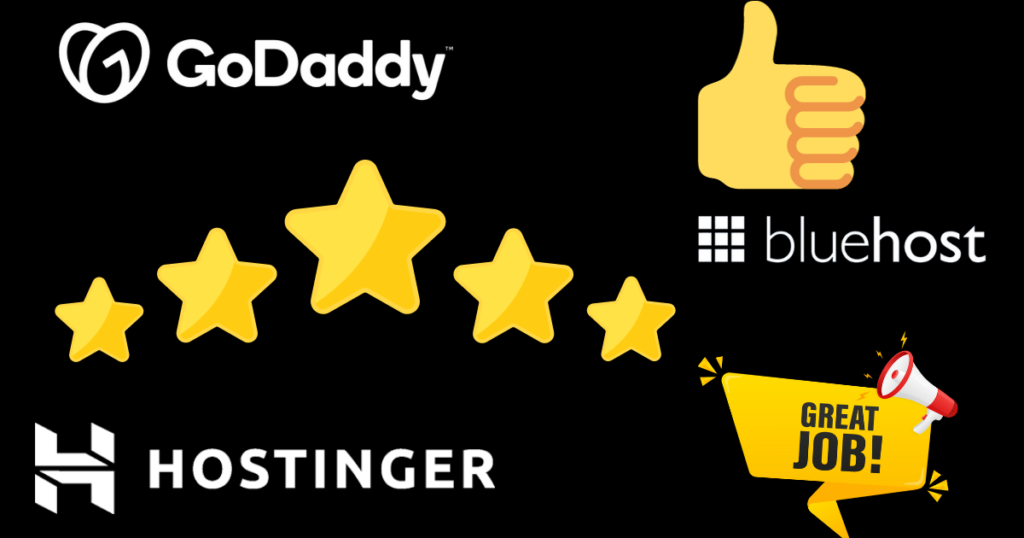Introduction:
The internet is always changing, so picking the right web hosting service is very important for the growth of your business. It can be hard to sort through all the choices when there are so many to choose from. These three big names—Godaddy, Bluehost, and Hostinger—will be put up against each other in this thorough study. We want to help you choose the best web hosting service for your needs in 2023 by looking at their pros and cons according to their features.

Godaddy:
Features:
- User-Friendly Interface: Godaddy boasts an intuitive control panel, making it easy for beginners to set up and manage their websites.
- Domain Registration: As a domain registrar giant, it simplifies the process of purchasing and managing domain names alongside hosting services.
- 99.9% Uptime Guarantee: With a strong commitment to reliability, Godaddy assures users of minimal downtime for their websites.
Benefits:
- Robust Security Features: Godaddy prioritizes website security, offering features like SSL certificates and daily malware scans to protect your site and visitor data.
- Customer Support: The hosting giant provides 24/7 customer support through various channels, including live chat and phone, ensuring assistance is available whenever you need it.
Drawbacks:
- Pricing Structure: While Godaddy often offers competitive introductory prices, the renewal rates can be comparatively higher.
Read: Godaddy review.
Bluehost:
Features:
- WordPress Integration: Bluehost is officially recommended by WordPress, providing seamless integration and optimized performance for WordPress websites.
- Scalability: Bluehost offers various hosting plans to cater to different needs, allowing users to easily upgrade as their website grows.
- Free Domain Name: Users receive a free domain name for the first year, saving initial costs for those starting a new website.
Benefits:
- Strong Performance: Bluehost is known for its reliable performance, offering fast loading times and consistent uptime.
- 30-Day Money-Back Guarantee: Bluehost stands behind its service with a 30-day money-back guarantee, allowing users to test their hosting without risk.
Drawbacks:
- Renewal Rates: Similar to Godaddy, Bluehost’s renewal rates can be higher than the initial promotional prices.
Bluehost: Read The Full review.
Hostinger:
Features:
- Affordable Pricing: Hostinger is renowned for its budget-friendly hosting plans, making it an attractive option for individuals and small businesses.
- LiteSpeed Cache: Hostinger incorporates LiteSpeed Cache to enhance website speed and performance, contributing to a better user experience.
- Global Data Centers: With servers located worldwide, Hostinger ensures low latency and faster loading times for websites across the globe.
Benefits:
- Excellent Loading Speeds: Hostinger prioritizes website speed, offering impressive loading times that can positively impact SEO and user satisfaction.
- 30-Day Money-Back Guarantee: Similar to Bluehost, Hostinger provides a risk-free trial period.
Drawbacks:
- Limited Advanced Features: While Hostinger is excellent for beginners, advanced users may find the lack of certain features limiting.
Exploring Additional Features Of Web Hosting Services:
Beyond the basic hosting features, it’s beneficial to explore the additional offerings each hosting provider brings to the table.
- Godaddy:
- Email Hosting: Godaddy provides robust email hosting services, ideal for businesses requiring professional communication solutions.
- Marketing Tools: With an array of marketing tools, Godaddy aids in promoting your website effectively.
- Bluehost:
- eCommerce Integration: Bluehost offers specialized eCommerce hosting plans, making it a solid choice for online stores.
- Marketing Credits: Users receive marketing credits for platforms like Google and Bing, aiding in website promotion.
- Hostinger:
- Website Builder: Hostinger includes a user-friendly website builder, empowering beginners to create and customize their sites without coding knowledge.
- Free Website Migration: For those looking to switch hosts, Hostinger offers free website migration services, simplifying the transition process.

Understanding Server Resources:
The performance of your website is intricately linked to the resources allocated by your hosting provider. Assess the following aspects:
- Godaddy:
- Shared Hosting: Godaddy’s shared hosting plans are suitable for small to medium-sized websites with moderate traffic.
- Virtual Private Servers (VPS): For those requiring more resources, Godaddy’s VPS plans offer increased performance and control.
- Bluehost:
- Shared Hosting with Resource Protection: Bluehost’s shared hosting includes resource protection, ensuring that the performance of your site is not compromised by neighboring websites.
- Dedicated Hosting: Bluehost’s dedicated hosting plans provide exclusive server resources for high-performance websites.
- Hostinger:
- Cloud Hosting: Hostinger’s cloud hosting is designed for scalability and reliability, offering resources on-demand.
- WordPress Hosting: Tailored for WordPress users, Hostinger’s WordPress hosting plans provide optimized resources for seamless performance.
Considering Data Backup and Recovery:
A comprehensive web hosting service should include robust backup and recovery options to safeguard your website data.
- Godaddy:
- Daily Backups: Godaddy offers daily automatic backups, providing a safety net in case of data loss or website issues.
- Bluehost:
- Site Backup Pro: Bluehost’s Site Backup Pro allows users to schedule regular backups and restore their site with ease.
- Hostinger:
- Weekly Backups: Hostinger provides weekly backups, ensuring that you have a recent snapshot of your website data.
Community and User Reviews:
Before finalizing your decision, delve into user reviews and community forums to gain insights into the real-world experiences of other users with each hosting provider. This step can provide valuable information about the quality of customer support, overall satisfaction, and any potential issues users may have encountered.
How to Choose the Best Web Hosting Service:
Before finalizing your decision, carefully consider the following factors:
- Performance: Evaluate the hosting provider’s uptime guarantees and loading speeds to ensure they align with your website’s performance requirements.
- Scalability: Choose a host that facilitates easy scalability, ensuring your hosting plan can adapt as your website grows in size and complexity.
- Customer Support: Prioritize hosts with reliable and accessible customer support channels to troubleshoot issues promptly.
- Security: Look for hosting providers that offer robust security features, including SSL certificates and malware scans, to safeguard your website and user data.
- Pricing: While comparing prices, consider not only the initial rates but also renewal costs to avoid any surprises in the long run.

Conclusion:
Selecting the best web hosting service is a decision that requires a comprehensive evaluation of your specific needs. If user-friendliness and domain registration are paramount, Godaddy may be your go-to choice. For those prioritizing seamless WordPress integration and top-tier performance, Bluehost emerges as a strong contender. Hostinger, with its affordable pricing and exceptional loading speeds, caters well to budget-conscious individuals and small businesses.
Ultimately, the victor in this web hosting showdown hinges on your unique priorities. Align the features and benefits offered by each provider with your website’s specific requirements, factoring in long-term goals and growth potential. Armed with this knowledge, you’ll be well-equipped to make an astute decision and embark on a successful online journey in 2023.
